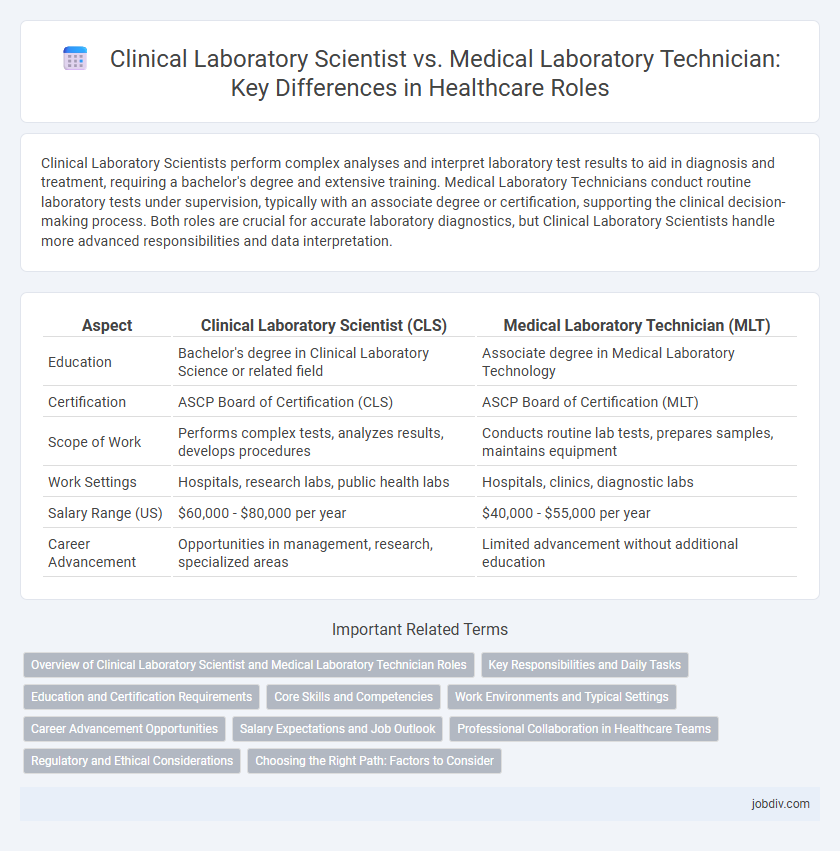Clinical Laboratory Scientists perform complex analyses and interpret laboratory test results to aid in diagnosis and treatment, requiring a bachelor's degree and extensive training. Medical Laboratory Technicians conduct routine laboratory tests under supervision, typically with an associate degree or certification, supporting the clinical decision-making process. Both roles are crucial for accurate laboratory diagnostics, but Clinical Laboratory Scientists handle more advanced responsibilities and data interpretation.
Table of Comparison
| Aspect | Clinical Laboratory Scientist (CLS) | Medical Laboratory Technician (MLT) |
|---|---|---|
| Education | Bachelor's degree in Clinical Laboratory Science or related field | Associate degree in Medical Laboratory Technology |
| Certification | ASCP Board of Certification (CLS) | ASCP Board of Certification (MLT) |
| Scope of Work | Performs complex tests, analyzes results, develops procedures | Conducts routine lab tests, prepares samples, maintains equipment |
| Work Settings | Hospitals, research labs, public health labs | Hospitals, clinics, diagnostic labs |
| Salary Range (US) | $60,000 - $80,000 per year | $40,000 - $55,000 per year |
| Career Advancement | Opportunities in management, research, specialized areas | Limited advancement without additional education |
Overview of Clinical Laboratory Scientist and Medical Laboratory Technician Roles
Clinical Laboratory Scientists (CLS) perform complex diagnostic testing, analyze laboratory results, and develop new testing procedures, typically requiring a bachelor's degree in medical technology or a related field. Medical Laboratory Technicians (MLT) conduct routine laboratory tests, prepare specimens, and operate laboratory equipment under supervision, generally holding an associate degree or certification. Both roles are critical in healthcare for accurate disease diagnosis, supporting patient treatment plans, and ensuring laboratory compliance with safety and regulatory standards.
Key Responsibilities and Daily Tasks
Clinical Laboratory Scientists perform complex analyses of patient specimens to detect diseases, interpret data, and ensure accuracy in test results using advanced laboratory equipment. Medical Laboratory Technicians conduct routine laboratory tests, prepare samples, and maintain laboratory instruments under the supervision of clinical scientists. Both roles collaborate to deliver precise diagnostic information, supporting patient care and treatment decisions.
Education and Certification Requirements
Clinical Laboratory Scientists typically hold a bachelor's degree in medical laboratory science or a related field, while Medical Laboratory Technicians usually require an associate degree or a postsecondary certificate. Certification for Clinical Laboratory Scientists often involves passing the American Society for Clinical Pathology (ASCP) Board of Certification exam, whereas Medical Laboratory Technicians may obtain certification through the ASCP MLT exam or similar accrediting bodies. Both roles require adherence to state-specific licensure requirements, which can vary but commonly include educational credentials and successful certification.
Core Skills and Competencies
Clinical Laboratory Scientists possess advanced expertise in analyzing complex biological samples, performing sophisticated diagnostic tests, and interpreting laboratory data to support accurate patient diagnoses. Medical Laboratory Technicians specialize in routine specimen collection, basic testing procedures, and maintaining laboratory equipment, ensuring reliable and timely test results. Both roles require strong attention to detail, proficiency in laboratory safety protocols, and the ability to adhere to quality control standards for optimal lab performance.
Work Environments and Typical Settings
Clinical Laboratory Scientists primarily work in hospital laboratories, research institutions, and public health settings, where they conduct complex diagnostic tests and analyze results to assist in patient care. Medical Laboratory Technicians often work in smaller clinics, physician offices, and commercial laboratories, performing routine laboratory tests under the supervision of clinical scientists. Both professionals contribute to healthcare by ensuring accurate laboratory results, but their work environments differ in scope and complexity.
Career Advancement Opportunities
Clinical Laboratory Scientists typically have greater career advancement opportunities due to their advanced education, such as a bachelor's or master's degree, enabling roles in specialized testing, research, and supervisory positions. Medical Laboratory Technicians usually hold associate degrees and often remain in entry-level laboratory roles with limited advancement to supervisory or specialized positions. Pursuing further education and certifications can enhance career growth prospects for both professionals in clinical laboratory settings.
Salary Expectations and Job Outlook
Clinical Laboratory Scientists typically command higher salaries, with median annual wages around $75,000, compared to Medical Laboratory Technicians, who earn approximately $54,000. Job outlook for both roles remains strong, projecting growth rates of 11% for Clinical Laboratory Scientists and 9% for Medical Laboratory Technicians through 2032. The advanced education and certifications required for Clinical Laboratory Scientists contribute to their superior earning potential and expanded job opportunities.
Professional Collaboration in Healthcare Teams
Clinical Laboratory Scientists and Medical Laboratory Technicians both play critical roles in healthcare teams by ensuring accurate diagnostic testing and patient care. Their collaboration bridges the gap between complex test analysis and routine laboratory procedures, enhancing diagnostic precision and workflow efficiency. Integrating their expertise supports interdisciplinary communication and accelerates informed clinical decision-making in healthcare settings.
Regulatory and Ethical Considerations
Clinical Laboratory Scientists adhere to rigorous regulatory standards set by bodies such as CLIA and CAP, ensuring high complexity testing accuracy and patient safety. Medical Laboratory Technicians operate under strict protocols with certification requirements emphasizing ethical practices and quality control in moderate complexity testing. Both roles must comply with HIPAA regulations, maintaining patient confidentiality and professional integrity in laboratory procedures.
Choosing the Right Path: Factors to Consider
Clinical Laboratory Scientists typically hold a bachelor's degree and perform complex diagnostic tests, making them essential in advanced medical analysis, while Medical Laboratory Technicians usually have an associate degree and handle routine laboratory procedures. Factors to consider when choosing the right path include educational commitment, desired job responsibilities, and long-term career advancement opportunities within healthcare settings. Salary expectations and certification requirements also play critical roles in aligning professional goals with each career's demands and rewards.
Clinical Laboratory Scientist vs Medical Laboratory Technician Infographic

 jobdiv.com
jobdiv.com